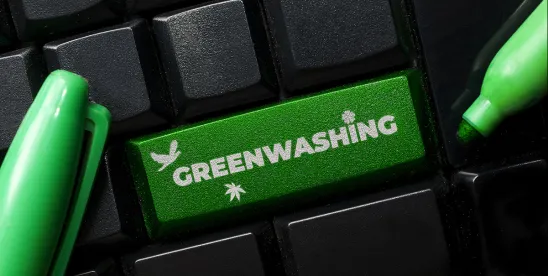Greenwashing Lawsuits Against Oil and Gas Companies—What Are They?
“Greenwashing” is the term for a company’s exaggerated, misleading, or unsupported claims about its environmental practices. In the oil and gas industry, allegations of greenwashing typically arise when a company known for its production of fossil fuels makes claims that it is working to reduce its carbon footprint, advertising its use of renewable energy technology, or utilizing a marketing campaign illustrated with the color green, natural landscapes, and/or phrases such as “eco-friendly.” You have probably seen these types of statements on billboards while driving down the freeway, on commercials while watching television, or even on social media while scrolling on your phone. Outside of advertising, some oil and gas companies have also made public commitments to reduce their investment in extracting fossil fuels.
To combat greenwashing, states, municipalities, and climate advocacy groups have been taking matters into their own hands—and into the courtrooms. In recent years, there has been a global uptick in lawsuits and complaints alleging that large oil and gas companies have deceived the public and made misleading statements about their impact on climate change. Until 2017, the total number of climate litigation cases numbered 884 across 24 countries, with 654 of the cases in the United States. But by 2020, this number nearly doubled to 1,550 cases across 38 countries.1 Oil and gas companies are not alone in facing these types of lawsuits. Greenwashing lawsuits have also been brought against airlines, restaurants, banks, retailers, and car companies.
Greenwashing lawsuits typically assert causes of action including state and federal claims of unfair and deceptive trade practices, fraud, false advertising, and public and private nuisance. In one example, an environmental group lodged a complaint against one of the supermajor oil and gas companies for misleading the public with an advertisement that focused on its low-carbon energy products, when more than 96% of its annual spend was on oil and gas. In a more recent example, climate activists brought suit against a major oil and gas company, alleging that its rebranding marketing campaign was misleading to consumers for suggesting it could reach net-carbon emissions by 2050 while continuing to invest in fossil fuels. While many of these lawsuits are still in the early stages of litigation, courts have weighed in on two strategic maneuvers used by oil and gas companies to defend against these claims:
Attempts to Remove the Greenwashing Lawsuits to Federal Court
In recent years, greenwashing cases brought under state consumer protection laws against large oil and gas companies have been stalled as a result of procedural arguments over the proper forum, specifically, whether these lawsuits should proceed in state or federal court. Attorney generals of Hawaii, Connecticut, and Vermont and the Cities of Baltimore and Charleston remain stuck fighting to keep their claims in state court while oil and gas companies have sought to remove these cases to federal court. For example, the journey for the proper forum in a lawsuit filed by the City of Baltimore against twenty-six oil and gas companies has been full of procedural twists and turns, taking almost four years to resolve. The city filed its complaint in state court in July of 2018; the companies removed the case to the Maryland federal district court; the federal court remanded the case to state court; the companies appealed; the Fourth Circuit affirmed the decision; the companies appealed to the U.S. Supreme Court who granted certiorari; the Supreme Court vacated the Fourth Circuit’s decision and required the panel to review all bases for removal; and finally, in April of 2022, the Fourth Circuit remanded the case to state court.
The Ninth and Tenth Circuits, as well as federal district courts in Connecticut and New Jersey, have ruled similarly, allowing for state consumer protection law claims against oil and gas companies to proceed in state court. The federal courts reason that there is no substantial federal question to support federal jurisdiction over these types of cases. Final venue decisions here are significant for two reasons: (1) these types of cases will likely move beyond the initial pleading phase and into the discovery phase of litigation; and (2) states, municipalities, and advocacy groups may be more likely to bring greenwashing claims against oil and gas companies now that a forum in state court is more certain.
Attempts to Invoke First Amendment Free Speech Protections
On May 24, 2022, a state court denied one of the world’s largest publicly traded international oil and gas company’s attempt to dismiss a greenwashing lawsuit by relying on a free speech statute. In Massachusetts v. ExxonMobil Corp.,2 Massachusetts’ Attorney General alleged that Exxon misled investors as to the effect burning fossil fuels had on climate and misled consumers by its promotional materials boasting that the company was taking steps to reduce carbon emissions. In doing so, the Attorney General asserted various violations of Massachusetts’ consumer protection laws.
Exxon moved to dismiss the case under the state’s anti-SLAPP3 statute, arguing that the lawsuit was motivated by its “petitioning” activity. The court determined that the anti-SLAPP statute could not be used to end the litigation because it applies only to private lawsuits, not civil enforcement proceedings brought by an attorney general. The court reasoned that including the attorney general in the statutory word “party” would prevent her from achieving her “critical” function: seeking enforcement of Massachusetts’ laws.
Adjacently, several years ago, a number of California municipalities sued a major oil and gas company regarding its allegedly false statements about climate change. The oil and gas company theorized that the California cities and counties wrongfully brought the lawsuits in an attempt to silence the company as a political actor. In response, the oil and gas company filed a pre-litigation4 petition in a Texas state court to investigate potential violations of the company’s First Amendment rights—identifying those same municipalities as defendants. The court ultimately held that Texas did not have personal jurisdiction over the California cities and counties and denied the oil and gas company’s attempt at investigating possible First Amendment claims.
Greenwashing Lawsuits Against Oil and Gas Companies—What’s Next?
While oil and gas companies have strategically attempted to either dismiss these lawsuits in their early stages or litigate the lawsuits in federal courts, they may have few tools left to avoid moving into the discovery phase of the lawsuit. States, localities, and advocacy groups have successfully discovered how to bring greenwashing lawsuits against major oil and gas companies in their preferred forum and survive dismissal. Such a result is likely to increase greenwashing litigation and could ultimately result in oil and gas companies proceeding to trial over statements regarding their environmental practices. Businesses concerned about the possibility of greenwashing lawsuits need to take a critical look at their public statements and marketing campaigns against evolving case law, statutes, and regulations to ensure that there is evidence and data to support their statements.
FOOTNOTES
1 Subodh Mishra, The Rise of Climate Litigation, Harvard Law School Forum on Corporate Governance (Mar. 3, 2022).
2 Commonwealth v. Exxon Mobil Corp., 489 Mass. 724, 187 N.E.3d 393, 394 (2022).
3 SLAPP stands for “strategic lawsuits against public participation.” Anti-SLAPP statutes are state statutes aimed at preventing litigation (or threats of litigation) designed to intimidate people using their First Amendment rights.
4 Texas Rule of Civil Procedure 202 is commonly used to identify defendants and avoid trial. Under Rule 202, a party can submit a petition to the court requesting authorization to take a pre-litigation deposition of a person or entity to investigate a potential suit and/or procure testimony for use in an anticipated suit.





 />i
/>i

